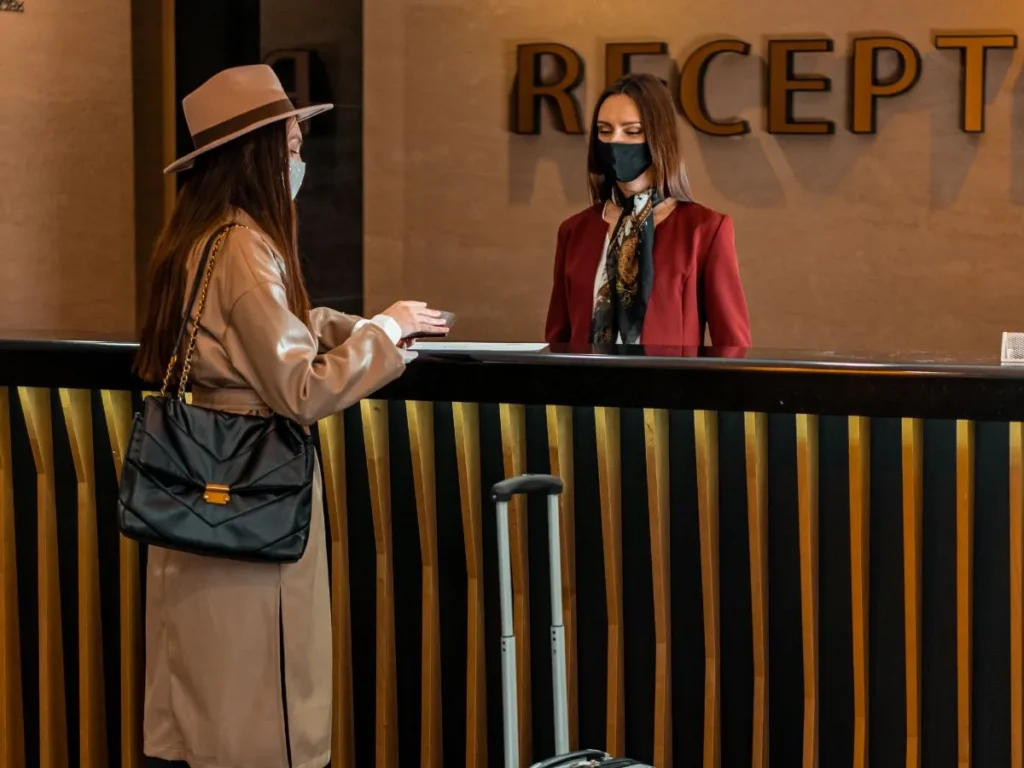In the hospitality sector, it is critical to emphasize the needs and comfort of all customers, especially those with specific requirements. To fully thrive in customer service, businesses must understand and satisfy their clients’ different demands. Assist Guests with Special Needs encapsulates the essence of hospitality: to deliver great service to every individual, regardless of their specific circumstances. Understanding the value of inclusion and accessibility is both a moral duty and a strategic economic need. Businesses that accommodate customers with unique needs may improve their reputation, encourage loyalty, and eventually increase revenue.
Throughout this book, we’ll look at practical solutions and best practices for helping visitors with special needs. Our primary goal will be to provide hospitality workers with the knowledge and skills they need to create inviting, inclusive settings. We’ll discuss seating arrangements, menu inclusivity, restroom accessibility, ADA compliance, check-in, and check-out procedures, serving guests with special needs, dealing with medical emergencies, and staff etiquette tips. Businesses that handle these essential aspects fully may ensure that all visitors, regardless of ability or restrictions, receive the attention and assistance they deserve. Let’s go on this adventure to discover how to successfully assist guests with special needs.
Create a Welcoming Atmosphere
Greeting and Welcoming All Guests Warmly
Assisting guests with special needs begins with a warm hello and welcome upon arrival. Hospitality workers set a pleasant tone for their guests’ whole stay by greeting them with a genuine smile and a warm welcome. The objective is to make every visitor, especially those with special needs, feel respected and loved from the time they walk through the door. This small but important gesture demonstrates a dedication to assisting guests with special needs, making them feel included and appreciated during their stay.
Providing Assistance as Needed from the Moment They Arrive
It is critical to be ready to help guests as soon as they arrive. Whether it’s advising on accessible routes, providing mobility aids, or aiding with baggage, hospitality staff should be proactive in meeting each guest’s specific needs. Establishments demonstrate their commitment to assisting guests with special needs by anticipating their needs and providing immediate assistance. Assist Guests with Special Needs emphasizes the significance of being sensitive to their specific needs and providing a smooth experience from the start.

Ensuring a Friendly and Inclusive Atmosphere
Creating a welcoming and inclusive environment is critical for making guests with special needs feel comfortable and respected. Hospitality workers should work to create an environment in which everyone feels accepted and valued. This entails establishing an environment of empathy and understanding within the organization. Every part of the ambiance, from space arrangement to staff conduct, should express a sense of warmth and openness. By embracing diversity and appreciating individual differences, businesses can provide a welcoming environment in which all visitors, including those with special needs, feel supported and cared for. Assist Guests with Special Needs reminds us to encourage inclusion in all interactions and aspects of service so that all guests feel welcome and respected.
Reconsider Your Seating Arrangements
Providing Accessible Seating Options for Guests with Mobility Issues
When redesigning seating arrangements, it is critical to ensure accessibility for all visitors, particularly those who have mobility challenges. One of the most important methods to assist guests with special needs in this area is to provide accessible seating alternatives. This might include making sure there are wheelchair-accessible tables with enough room for moving and comfortable seats. Furthermore, hospitality workers should ensure that walkways are broad enough to allow mobility aids such as wheelchairs or walkers. Establishments may demonstrate their commitment to diversity and accessibility by proactively meeting the requirements of visitors with mobility issues.
Accommodating Various Group Sizes and Preferences
Another significant feature of seating arrangements is to accommodate different group sizes and visitor preferences. Hospitality providers should attempt to provide a variety of seating alternatives that accommodate varied party sizes and tastes. This might entail offering private tables for couples, bigger booths for families, or adaptable seating configurations that can accommodate larger parties. By providing seating options and flexibility, restaurants can guarantee that every visitor feels comfortable and respected. This proactive approach to seating arrangements is consistent in assisting guests with Special Needs by fulfilling their unique needs and preferences.
Being Flexible and Proactive in Rearranging Seating Arrangements
Flexibility is essential when it comes to seating arrangements in the hospitality business. Hospitality personnel should be ready to adjust and rearrange seating arrangements as needed to meet changing conditions or guest preferences. This may entail being proactive in anticipating visitors’ requirements and making modifications accordingly. For example, if a guest with mobility difficulty wants a certain seating arrangement, personnel should be prepared to fulfill this request immediately. By being adaptable and proactive in adjusting seating arrangements, businesses can guarantee that all customers feel welcome and comfortable. This proactive approach to seating arrangements reflects a desire to assist guests with special needs and provide a great experience for all guests.

Changing seating arrangements is critical for establishing an inclusive and inviting experience in hospitality companies. Establishments may successfully assist guests with special needs by providing accessible seating alternatives, meeting different group sizes and preferences, and being flexible and proactive in adjusting seating arrangements.
Create Inclusive Menus
Offering a variety of menu options
- To successfully assist guests with special needs, it is necessary to provide a varied choice of menu options that accommodate various dietary restrictions and preferences.
- Include vegetarian, vegan, gluten-free, dairy-free, and nut-free foods to suit guests with special dietary requirements.
- Consider serving meals influenced by other cuisines to create diversity and appeal to visitors with varying culinary tastes.
- By providing a diverse menu variety, enterprises may ensure that all customers, regardless of dietary limitations, can find something appropriate and pleasurable.
Providing clear and detailed descriptions
- Make sure that each menu item has a clear and accurate explanation, including any allergies in the meal.
- Identify common allergies like nuts, dairy, gluten, and shellfish to help visitors make educated food choices.
- Include details of the ingredients, cooking processes, and any potential cross-contamination hazards to ensure that diners have a thorough grasp of the cuisine.
- By offering precise information, restaurants enable customers to make choices that are compatible with their dietary restrictions and preferences, ultimately improving their eating experiences.
Offering alternatives or modifications
- Respond to customers’ requests for menu alternatives or adaptations to assist visitors with special needs.
- To meet specific dietary needs, accommodate requests for product substitutions, amount changes, or cooking variations.
- Train employees to address requests with compassion and professionalism, so that visitors feel appreciated and respected.
- Businesses can ensure that all customers have a satisfactory and inclusive eating experience tailored to their specific requirements by offering flexibility and customization choices.
Empowering guests with options
- Empower visitors by offering a range of food selections tailored to their unique dietary requirements and preferences.
- Offer customizable dishes or build-your-own alternatives, allowing visitors to design meals based on their preferences and dietary needs.
- Provide information about alternate ingredients or preparation techniques for visitors with food sensitivities or allergies.
- By providing visitors with choice over their eating experience, businesses demonstrate their dedication to fulfilling the requirements of all customers, promoting a friendly and inclusive atmosphere.
Training staff to assist guests
- Educate personnel on menu alternatives, allergies, and dietary restrictions to enable them to properly assist guests with special needs.
- Ensure that employees can give appropriate information and advice to visitors who have dietary concerns or preferences.
- Create a culture of empathy and understanding among staff members, emphasizing the necessity of meeting visitors’ needs with respect and professionalism.
- By providing employees with the required skills and information, businesses can ensure that every visitor receives attentive and individualized service that improves their dining experience.

Eliminate Restroom Stress
Ensure restrooms are easily accessible and well-maintained.
- To assist guests with special needs, bathrooms should be conveniently accessible and well-maintained.
- Place bathrooms in handy and accessible locations, making them immediately visible and well-labeled.
- Regularly examine and maintain bathrooms to ensure cleanliness, operation, and accessibility compliance.
- By putting accessibility and upkeep first, businesses may reduce stress and create a comfortable bathroom experience for all customers, including those with special needs.
Installing Grab Bars and Other Accessibility Features
- Install grab bars and other accessible features in toilets to help guests with special needs, especially those who have mobility challenges.
- Place grab bars near bathrooms and sinks to help guests with mobility.
- Consider adding features like accessible sinks, toilet seat risers, and railings to improve accessibility.
- By adopting these elements, businesses demonstrate their commitment to providing a safe and welcoming bathroom environment for all visitors.
Providing Assistance or Accommodations
- Provide support or accommodations for guests with mobility challenges to help guests with special needs navigate toilets.
- Train employees to be proactive in assisting, such as assisting visitors with mobility devices or guiding them to accessible facilities.
- Consider adding extra conveniences, such as higher toilet seats or portable ramps, to help guests with special requirements.
- By providing help and accommodations, businesses may guarantee that all customers feel supported and comfortable when utilizing toilet facilities.

Maintaining Cleanliness and Hygiene
- To keep toilets clean and sanitary, sterilize them regularly.
- Ensure that guests have enough soap, paper towels, and toilet paper to maintain personal hygiene.
- Implement regular cleaning routines and practices to quickly address any spills or messes.
- By addressing cleanliness and hygiene, businesses may create a pleasant and sanitary restroom environment that improves the entire client experience.
Ensuring Privacy and Safety
- Ensure that restrooms provide enough privacy and security for all guests.
- Install locks on restroom doors to ensure guests’ privacy and security while using the facilities.
- Consider establishing gender-neutral or family-friendly toilets to meet a variety of requirements and preferences.
- By putting privacy and safety first, businesses can create a friendly and inclusive bathroom atmosphere in which all customers feel comfortable and valued.
Be Aware of ADA Guidelines and Obligations
| ADA Requirement | Guidelines |
| Accessible Parking | Provide dedicated accessible parking places near the entrance, together with appropriate signs and access aisles. |
| Accessible Entrances | Make sure the entrances are broad enough to accommodate wheelchairs and include ramps or elevators for guests with mobility issues. |
| Accessible Restrooms | Install accessible restrooms with proper grab bars, sink height, and toilet seat height to accommodate guests with disabilities. |
| Accessible Pathways | Maintain open and broad routes throughout the institution so that visitors with mobility disabilities can easily traverse. |
| Assistive Listening Systems | During events or lectures, make available assistive listening equipment to guests with hearing impairments. |
| Service Animals | Allow service animals to accompany visitors with impairments throughout the institution, as per ADA standards. |
| Communication Access | Ensure efficient communication with visitors who are deaf or hard of hearing by using sign language interpreters, captioning services, or text communication devices. |
Ensuring Compliance with Accessibility Standards
To successfully assist guests with special needs, facilities must conform to the Americans with Disabilities Act’s (ADA) accessibility regulations. This includes adhering to standards governing parking, entrances, bathrooms, paths, assistive listening equipment, service animals, and communication access. By proactively satisfying these needs, businesses foster an inclusive atmosphere in which all guests feel welcomed and accommodated.
Training Staff to Effectively Assist Guests with Disabilities
- Understanding Disability Sensitivity: Employees should receive training on the variety of impairments and how to communicate properly and sensitively with visitors with special needs.
- Knowledge of ADA requirements: Staff should be conversant with the Americans with Disabilities Act (ADA) requirements to assure compliance and comprehend the rights of disabled visitors.
- Recognizing Different Needs: Teach employees to recognize various types of impairments, as well as the specific challenges and modifications that may be required for each.
- Communication Skills: Teach good communication skills, such as speaking, using suitable vocabulary, and accommodating varied communication styles, such as sign language or written communication.
- Assisting with Mobility: Teach personnel how to help visitors with mobility impairments around the premises, provide mobility devices like wheelchairs or walkers, and provide accessibility in seating places.
- Service Animal Guidance: Train personnel on service animal rules, such as identifying legal service animals and explaining their rights to accompany visitors around the facility.
- Handling assistive equipment: Teach visitors with hearing or vision impairments how to use assistive equipment, including hearing aids, cochlear implants, and braille readers.
- Ensure your staff is trained in emergency protocols to assist guests with disabilities, including evacuating customers with mobility impairments and effectively communicating with guests who may have difficulty hearing or seeing during an emergency.
- Problem-Solving Skills: Provide staff with the problem-solving ability to manage unforeseen events or guest demands, such as finding alternate accommodations or solutions to fulfill the requirements of visitors with disabilities.
- Empathy and Respect: When aiding visitors with disabilities, highlight the value of empathy, patience, and respect. Encourage employees to listen intently, demonstrate empathy, and go above and beyond to make every guest feel appreciated and respected.

Handling Check-in and Check-out for Disabled Guests
To successfully assist Guests with Special Needs during the check-in and check-out procedures, accessible solutions must be made available. This might include having accessible check-in stations with lowered desks or installing wheelchair-friendly check-in kiosks. Additionally, giving online check-in choices or assistance with form completion might make it easier for visitors with disabilities to manage the procedure. Establishments may offer a welcome and inclusive experience for all customers by making check-in and check-out procedures as accessible and flexible as possible.
Offering Assistance with Luggage and Navigating the Premises
Another important component of offering excellent service is assisting guests with disabilities with their luggage and traversing the grounds. Staff should be educated to assist visitors with luggage, direct them to their rooms or other sections of the property, and provide information on accessible routes and services. Furthermore, providing mobility alternatives such as golf carts or wheelchairs can help guests with special needs navigate the grounds more easily and safely. By providing proactive help and support, businesses can make sure that visitors with disabilities feel appreciated and supported during their stay.
Ensuring Privacy and Confidentiality for All Guests
Privacy and confidentiality are critical concerns when conducting check-in and check-out procedures for all visitors, including those with impairments. Staff should be educated to handle guest information discreetly and professionally, ensuring that personal information is kept private at all times. Additionally, giving private check-in and check-out choices, as well as discreet assistance, may make visitors with disabilities feel more at ease and appreciated. By emphasizing privacy and secrecy, businesses demonstrate their dedication to creating a welcoming and inclusive atmosphere for all visitors.
How to Assist Guests With Special Needs
Understanding individual needs and preferences
Demographic Awareness: Recognize visitor variety by recognizing their requirements and preferences based on demographic aspects such as age, cultural background, dietary restrictions, and mobility limits.
Research and Training: Conduct research and give continual training to personnel to raise awareness and comprehension of the unique requirements and preferences of various guests.
Customization: Tailor services and facilities to particular guest populations’ tastes, such as giving customized meal selections for customers with dietary restrictions or making accessible rooms for those with mobility disabilities.
Communication Channels: Create open communication channels for visitors to communicate their wants and preferences, ensuring that their specific requirements are handled with care and respect.

Serving Aged or Elderly Guests:
- Understanding Individual Needs: Recognize that older or elderly visitors may have special mobility, comfort, and health requirements. Pay attention to their specific needs and offer specialized support.
- Mobility Assistance: Provide wheelchair access, railings, or ramps to ensure that older or elderly visitors may travel the premises securely and pleasantly.
- Comfortable Accommodations: Offer accommodations that are tailored to the comfort and convenience of older or senior clients, such as accessible rooms, adjustable beds, and items that promote relaxation and ease of use.
- Accessible Facilities: Make sure that all facilities, such as eating areas, bathrooms, and common spaces, are easily accessible to older or senior visitors. Install grab bars, non-slip mats, and other safety elements to improve accessibility and reduce accidents.
- specialist Services: Provide specialist services suited to the needs of senior or older clients, such as room service, baggage help, or transportation arrangements for trips and appointments.
- Patience and Respect: Be patient, polite, and respectful while interacting with older or elderly guests. Take the time to hear their problems and desires, and respond with respect and understanding.
- Engagement & Socialization: Offer chances for older or senior clients to participate in social activities and socialize with others, such as group trips, game evenings, or scheduled events at the business.
- Health & Wellness Support: Be ready to help with health-related issues such as medication administration, mobility aids, and access to medical services or facilities.
- Clear Communication: Communicate clearly and effectively with older or elderly visitors, using simple language and visual aids as needed to enhance comprehension and reduce misunderstanding.
- Regular Check-ins: Check in with older or elderly visitors regularly to verify that their requirements are fulfilled and to address any concerns or difficulties that may develop during their stay. Establishments may ensure that old or elderly clients feel appreciated, respected, and properly cared for throughout their visit by giving personalized attention and support.

Serving Infants or Young Children:
- Child-Friendly Amenities: Provide cribs, high chairs, and baby-changing stations to meet the requirements of newborns and small children. Make sure these amenities are clean, well-maintained, and easily available to parents and caregivers.
- Safe and Secure Environment: Implement childproofing techniques such as outlet covers, cabinet locks, and safety gates to make the environment safe and secure for newborns and young children. Ensure that play spaces are safe and monitored by skilled professionals.
- Kid-Friendly Menus: Provide kid-friendly menus with a range of selections that appeal to young palates, such as healthy choices and classic favorites. Provide alternatives for children with dietary restrictions or food allergies so that everyone may have a satisfying dinner.
- Engaging Activities: Plan engaging activities and entertainment for children, such as arts and crafts classes, storytelling sessions, or outdoor play spaces. Keep youngsters engaged and occupied while their parents or caregivers unwind and enjoy their visit.
- Family-Friendly Accommodations: Offer family-friendly amenities such as linked rooms, additional bedding options, and large bathrooms. Ensure that the accommodations are tailored to the needs of families traveling with newborns and small children.
- Childcare Services: Provide childcare or babysitting services to parents who want some time alone. Provide skilled workers to oversee and entertain children in a secure and supportive atmosphere.
- Special Attention to Babies: Take into account the particular requirements of infants, such as feeding schedules, slumber periods, and changing diapers. Create a peaceful and pleasant environment for nursing women, and make sure that infant necessities like formula, diapers, and wipes are easily accessible.
- Educational Opportunities: Provide educational activities for children, such as nature walks, instructional tours, or interactive displays. Give children an opportunity to study and explore in a fun and engaging manner.
- Family-Friendly rules: Implement rules that cater to the requirements of parents traveling with babies and young children, such as flexible check-in and check-out timings, free meals for children, and discounts on family activities.
- Attentive Staff: Teach staff to be alert and sensitive to the needs of babies and young children, such as assisting with strollers, carrying bags, or finding lost toys. Ensure that all staff members are courteous, approachable, and informed about the requirements of families with children.
Serving Guests With Health Issues:
- Medical help: Make medical help and support services available to visitors who have health difficulties. This might involve having trained medical personnel on-site, giving access to medical equipment or supplies, and informing people about local medical services.
- Unique Dietary Considerations: Help visitors with health difficulties by providing unique dietary alternatives or adjustments that match their individual dietary needs or limits. This might include providing gluten-free, dairy-free, or low-sodium menu options, as well as addressing dietary allergies or intolerances.
- Comfortable Accommodations: Make sure that the accommodations are comfortable and accessible to guests with health difficulties. This may include offering adjustable beds, ergonomic furnishings, and accommodations near elevators or other facilities.
- Safety precautions: Take precautions to guarantee the health and welfare of visitors with health concerns. This might include adding grab bars to restrooms, non-slip mats in showers, and emergency call buttons in guest rooms.
- Medication support: If a visitor needs medication management support, provide it. This might include providing safe medicine storage, reminding guests to take their medication, or arranging for drug delivery.
- Emergency Preparedness: Create and implement emergency protocols that consider the requirements of visitors with health concerns. Train employees on how to respond to medical situations and keep emergency contact information easily available.
- Accessibility Considerations: Make sure that all facilities are accessible to visitors with medical conditions. This might involve installing wheelchair ramps, elevators, and accessible facilities, as well as ensuring that walkways are clean and well-lit.
- Individual Attention: Provide individual attention and assistance to visitors with health difficulties. This may include checking in frequently to verify that visitors are comfortable and responding to any concerns or requests as soon as possible.
- Privacy and Confidentiality: Please respect the privacy and confidentiality of guests who are sick. Ensure that medical information is kept secret and that visitors feel at ease addressing their health concerns with personnel.
- Communication and Empathy: Communicate with visitors who are experiencing health concerns with empathy and compassion. Listen to their issues and preferences, then give support and help in a polite and non-intrusive manner.

Serving single guests:
- Warm Welcome: Upon arrival, greet single guests with a warm and friendly ambiance. Greet them with a cheerful smile and offer to help with baggage or any other requirements they may have.
- Comfortable accommodation: Ensure that single guests’ lodgings are both comfortable and well-appointed. Provide facilities such as a comfy bed, a workplace, and complimentary toiletries to help them enjoy their stay.
- Booking Flexibility: Provide single customers with flexible booking alternatives, such as single occupancy prices and the flexibility to schedule last-minute or short-term stays. Provide a simple booking procedure to meet their demands.
- Interesting Activities: Plan interesting activities and social events just for single visitors to promote engagement and camaraderie. This might include cocktail hours, group trips, or themed meals.
- Respect for Privacy: Respect single visitors’ privacy and avoid making judgments about their situations. Make sure they are comfortable and cherished as individual guests.
- Provide solo-friendly eating alternatives that are tailored to the needs of solitary customers. Offer reduced meal sizes, community dining tables, or bar seating for people who want to eat alone.
- Individualized recommendations: Provide individualized recommendations for area sights, eating alternatives, and activities based on individual visitors’ interests and preferences. Help them make the most of their stay in the region.
- Safety and Security: Make sure single guests feel safe and secure during their stay. Implement security measures like key card access to guest rooms and well-lit parking lots to give peace of mind.
- Social Opportunities: Provide opportunities for solitary visitors to mingle and connect with other guests if they like. This might include scheduled trips, group exercise sessions, or networking activities.
- Attentive attention: Provide single visitors with attentive and individualized attention during their stay. Anticipate their requirements, give support as required, and make sure their solo travel experience is unique and joyful.
Providing Personalized Service with Attention to Detail:
Customize services and facilities to fit each guest’s unique requirements and preferences, resulting in a personalized and memorable experience.
Anticipate visitors’ wants and preferences based on demographics and address them proactively to improve their comfort and happiness.
Pay close attention to detail in all aspects of service delivery, from hotel amenities to dining choices, to surpass customers’ expectations and leave a lasting impression.
Anticipate and address any potential concerns or challenges:
Proactively identify possible issues or obstacles that visitors may have during their stay and take action to remedy them before they occur.
Maintain open lines of contact with guests to handle any issues or complaints in a timely and effective manner, displaying a dedication to their happiness and well-being.
Continuously monitor visitor comments and reviews to identify areas for improvement and put in place tactics to improve the overall guest experience.
How to Handle Medical Emergencies in a Hotel
Medical crises can arise at any moment, so hotels must be prepared to accommodate guests with specific requirements quickly and effectively. Hotels can assure all guests’ safety and well-being by providing sufficient training, maintaining necessary equipment, and creating clear communication lines.
Training staff on emergency response procedures.
To assist guests with special needs during medical crises, hotel personnel must get extensive training in emergency response protocols. This training should include a variety of scenarios, such as cardiac arrest, choking, allergic reactions, and other medical crises that visitors may encounter.
Staff personnel should be educated to stay calm and controlled in high-pressure circumstances while still acting promptly and decisively to give aid. They should also be aware of the location and functioning of critical emergency equipment, such as first aid kits and automated external defibrillators (AED).
Regular drills and simulations can assist in reinforcing staff training and ensure that personnel are adequately equipped to respond to medical crises. Hotels may increase their capacity to handle medical crises and give prompt help to customers with special needs by training their personnel in the required skills and knowledge.
Maintaining well-stocked first aid kits and AEDs.
In addition to educating employees, hotels must guarantee that they have enough medical equipment on hand to assist guests with special needs in an emergency. This includes keeping well-stocked first aid kits and AEDs in convenient locations throughout the property.
Bandages, gauze, adhesive tape, antiseptic wipes, and disposable gloves are all vital components in a first aid bag. AEDs should be inspected and serviced regularly to guarantee that they will function properly in the case of a cardiac emergency.
Hotels that have these crucial medical items on hand may give prompt aid to guests in need, potentially saving lives during medical emergencies.
Establishing Clear Communication Channels With Emergency Services
Effective communication is essential during medical emergencies to ensure that proper aid is delivered in a timely fashion. Hotels should create clear contact lines with local emergency services, such as hospitals, paramedics, and fire departments.
Staff members should be instructed to promptly notify emergency services and provide correct information about the nature of the emergency and the location of the occurrence. This might include appointing certain staff members as emergency response coordinators or developing methods for calling emergency services directly.
Hotels should also have protocols in place to communicate with guests and provide status updates during medical situations. Clear signs and instructions should be provided around the property to direct visitors to emergency exits and assembly places in case of an evacuation.
Hotels that develop clear communication lines with emergency services and guests can provide a coordinated response to medical crises and prompt help to visitors with special requirements.

Etiquette Tips for All Employees
In addition to disaster readiness, hotels should focus on great customer service and professionalism to improve the entire visitor experience.
A. Treating all guests with respect and courtesy.
Regardless of their specific requirements or circumstances, all visitors should be treated with dignity and kindness at all times. This involves welcoming guests pleasantly, using their chosen name or title, and paying close attention to their requests and concerns.
B. Being attentive and responsive to guest needs.
Hotel personnel should be attentive and responsive to guests’ requirements during their stay. This might include assisting guests with baggage, recommending local sights or eating alternatives, or handling any difficulties or concerns that emerge during their stay.
C. Maintaining professionalism and discretion at all times.
Hotel staff should be professional and discreet in their dealings with customers and colleagues. This includes maintaining guest privacy and confidentiality, abstaining from gossip and improper behavior, and following the hotel’s code of conduct and standards.
Also Read: Mastering Table Manners for Job Interview
Conclusion
To summarize, managing medical crises at a hotel necessitates a proactive approach that emphasizes the safety and well-being of all visitors, including those with special needs. Hotels can successfully respond to medical emergencies and give prompt aid to guests in need by educating employees in emergency response procedures, maintaining critical medical equipment, and creating clear communication lines with emergency services.
Furthermore, by following etiquette guidelines such as treating all guests with respect and courtesy, being attentive and responsive to guest needs, and maintaining professionalism and discretion at all times, hotels can improve the overall guest experience and foster a welcoming and inclusive environment for all.
I encourage hotels to use the tactics listed above to improve their capacity to handle medical crises and deliver outstanding customer service to all visitors, regardless of their specific requirements or circumstances. Hotels that prioritize diversity and outstanding customer service may provide memorable and pleasant experiences for their visitors while also developing long-term connections that generate customer loyalty and pleasure.
